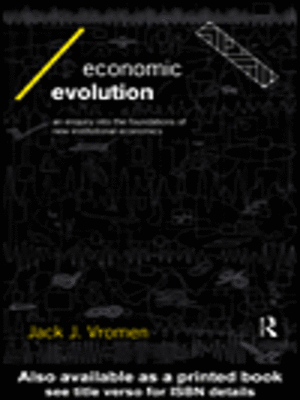Economic Evolution
ebook ∣ An Inquiry into the Foundations of the New Institutional Economics · Economics as Social Theory
By Jack Vromen

Sign up to save your library
With an OverDrive account, you can save your favorite libraries for at-a-glance information about availability. Find out more about OverDrive accounts.
Find this title in Libby, the library reading app by OverDrive.



Search for a digital library with this title
Title found at these libraries:
| Library Name | Distance |
|---|---|
| Loading... |
The new institutional economics offers one of the most exciting new agendas in economics - the economic analysis of the evolution of institutions. Yet a careful ... of what is meant by evolution has been missing. This book fills this lacuna.
It focuses on three of the approaches which are cental to the new institutional economics:
* the new theory of the firm, with particular emphasis on Oliver Willamson's transaction cost economics
* evolutionary economics, taking the work of Nelson and Winter as the benchmark
* game theoretic accounts of the spontaneous evolution of conventions and institutions inspired by Hayek
The analysis shows that attempts to group these approaches under the same broad heading conceals many important differences. Not the least of these are the different meanings given to such key concepts as 'institution' and 'evolution'. Despite these differences, the book does identify two evolutionary mechanisms that govern processes of economic change in each of the approaches which is discussed. Drawing on recent work in biology and philosophy of science the author identifies some unresolved issues in attempts to transfer the concepts of evolutionary biology to economics. The book poses questions which no self-conscious economist working on evolutionary issues can afford to ignore
It focuses on three of the approaches which are cental to the new institutional economics:
* the new theory of the firm, with particular emphasis on Oliver Willamson's transaction cost economics
* evolutionary economics, taking the work of Nelson and Winter as the benchmark
* game theoretic accounts of the spontaneous evolution of conventions and institutions inspired by Hayek
The analysis shows that attempts to group these approaches under the same broad heading conceals many important differences. Not the least of these are the different meanings given to such key concepts as 'institution' and 'evolution'. Despite these differences, the book does identify two evolutionary mechanisms that govern processes of economic change in each of the approaches which is discussed. Drawing on recent work in biology and philosophy of science the author identifies some unresolved issues in attempts to transfer the concepts of evolutionary biology to economics. The book poses questions which no self-conscious economist working on evolutionary issues can afford to ignore







